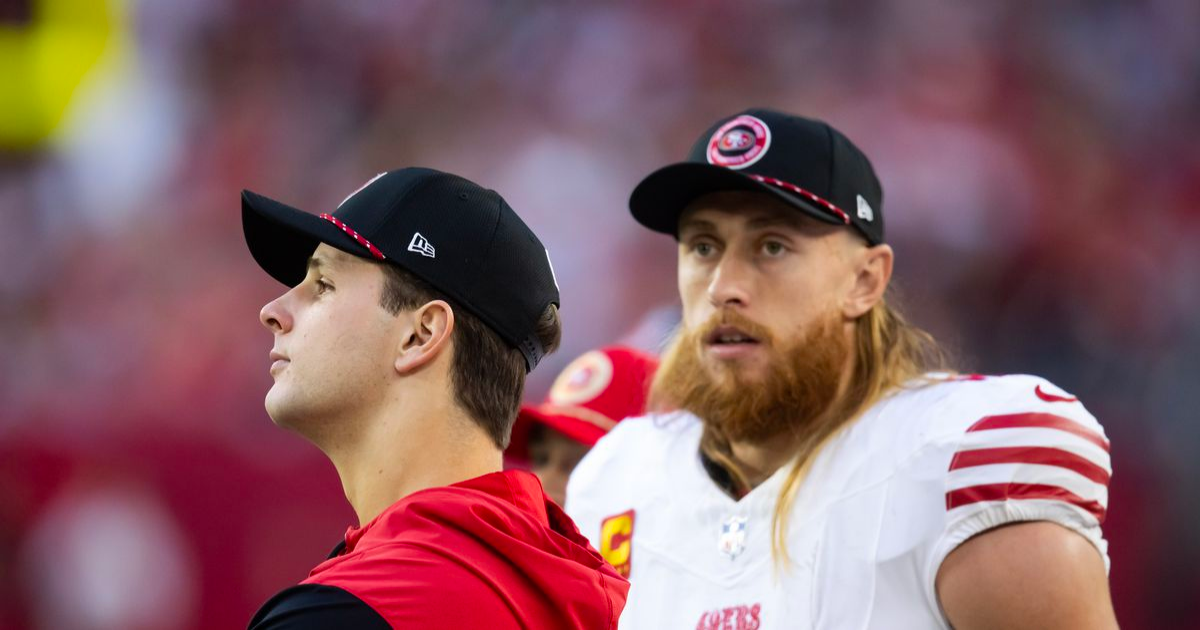The San Francisco 49ers signed tight end George Kittle to a record-breaking four-year, $76.1 million extension on Tuesday that includes $40 million guaranteed.
Kittle, heading into his age-32 season, is arguably the league’s best tight end and seemingly wanted to be compensated as such. His four-year, $76.1 million deal narrowly eclipses the four-year, $76 million deal that Arizona Cardinals star tight end Trey McBride signed earlier this offseason.
There was initially worry that a contract dispute between Kittle and the 49ers would come about this offseason, as The Athletic’s Mike Silver reported prior to the start of voluntary workouts that the tight end was a ‘longshot’ to report due to contract talks.
Nonetheless, San Francisco got the deal done, making Kittle the highest-paid tight end in the NFL on a deal that likely keeps him in the Bay Area for the remainder of his career.
For years, the 49ers have been embroiled in contract disputes with their stars, with several extensions carrying over deep into the offseason, including Brandon Aiyuk’s four-year, $120 million deal last year.
So, it’s a good sign that the team was able to quickly get something done with Kittle here this offseason, especially as they got the tight end to report shortly after the start of offseason workouts.
Now, in the Kittle situation, it’s understandable that it took up until this time. McBride was expected to receive an extension this offseason, and it’s always more favorable to be the second player to earn your deal at a certain position group, as you can use the first deal as a benchmark.
That seems to be the case with Kittle here, as the 49ers star got $400,000 more than McBride over the four years. Additionally, Kittle got $2.5 million more guaranteed at signing, according to Spotrac, which is usually the most important part of a contract negotiation.
So, it made sense for Kittle to wait for McBride’s deal, and there wasn’t expected to be another contract extension that would challenge the top of the tight end market. Which is why it was imperative the 49ers got this deal done sooner rather than later; there wasn’t any other competition with another team/player that would’ve made them play hardball.
This deal could be a good sign of things to come when it comes to getting deals done early for the 49ers. Things seem to be trending well with Brock Purdy’s contract talks, while Fred Warner hasn’t posed any contract dispute, so it’s more of a quiet offseason for the 49ers.
But, there needs to be more of a change for the organization, as they’ve hurt themselves by dragging out several contract extensions, ultimately paying more than they would’ve had to if they read the market right earlier in the offseason.
Take Brandon Aiyuk, for example. The wideout was reportedly asking for $24-26 million annually when contract talks started at the beginning of last offseason, but the 49ers played hardball. It was clear that several other wide receiver contract extensions were going to happen, which made it smarter to get a deal done sooner rather than later.
Ultimately, San Francisco waited and had to pay Aiyuk a four-year, $120 million deal, which is much higher than that initial $24-26 million ask. Teams like the Philadelphia have constantly gotten deals done early, even if they come at a high cost, knowing that the salary cap continues to rise, with markets increasing at every position as a result.
The 49ers need to get on that trend, which has started here with Kittle and could continue with Brock Purdy’s contract extension. There isn’t much competition there when it comes to other quarterbacks resetting the market this offseason, so the benchmarks are already in place. Now, it’s time to buckle up and get it done.
